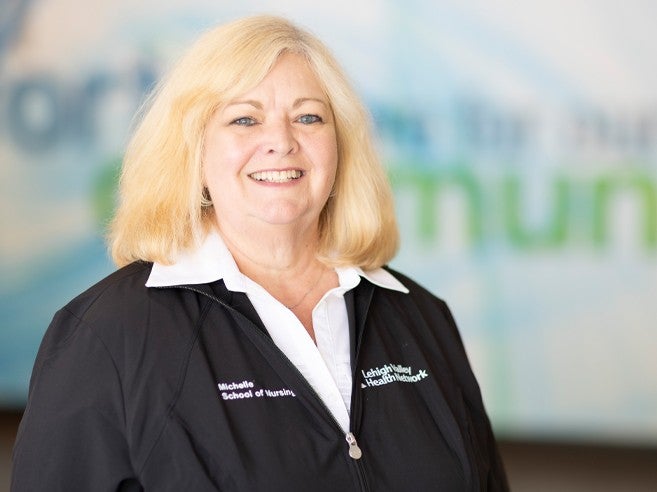
Our Mission, Goals and Philosophy
Page Hierarchy
- Education
- Joseph F. McCloskey School of Nursing
- Our Mission, Goals and Philosophy
Mission Statement
The Joseph F. McCloskey School of Nursing at Lehigh Valley Health Network is committed to providing quality nursing education that prepares graduates to seek licensure as a registered nurse and to provide safe, quality, evidence-based, patient-centered nursing care in a variety of health care settings.
Vision
To be recognized as a nationally accredited, excellent nursing education program by students, peers, employers and the community.
Goals
The goals of the Joseph F. McCloskey School of Nursing include:
- Preparing the graduate to practice as an entry-level professional nurse who utilizes evidence-based practice when providing quality care to patients in a variety of health care settings.
- Promoting commitment to lifelong learning to enhance professional practice.
- Contributing to the development of responsible nursing leaders by integrating theories and concepts of leadership and management into nursing practices.
- Developing responsible and accountable graduates who practice within the legal limits and professional and ethical standards of nursing.
Philosophy
The faculty of the Joseph F. McCloskey School of Nursing believe that:
Nursing is a process by which theoretical and scientific knowledge is combined with caring and compassionate behaviors for the purpose of assisting patients to move in the direction of optimal health. Nursing recognizes that health is a dynamic state of equilibrium that exists on a continuum and is unique to a patient’s values and beliefs. Nursing encompasses the promotion of wellness, the care and prevention of illness or disability, and the rehabilitation of patients, families, and groups in health care and community settings. The patient or designee is recognized as the source of control and is a full partner in providing compassionate and coordinated care that respects the patient’s preferences, values and needs. Nursing involves direct care, therapeutic communication, teaching and application of the nursing process to facilitate holistic care. Through the use of critical thinking and interprofessional collaboration, the nurse develops and implements a plan of care for preventive, supportive and rehabilitative services across the patient’s life span.
Education is a lifelong learning process by which behavior is changed through the acquisition of knowledge, skills and attitudes. Nursing education guides and encourages these behaviors in learning and practice, preparing the student for fulfillment of his/her role in nursing. Nursing education correlates theoretical and scientific knowledge and evidence-based nursing practice with varied learning experiences. Evidence-based nursing practice integrates the best current evidence with clinical expertise and patient/family preferences and values for delivery of optimal and safe health care. Nursing education is founded on evidence-based practice and promotes wellness in the community through health screening and patient education. The educational process is enhanced when there are clearly defined learning outcomes and educational experiences that progress from simple to complex, requiring knowledge and skills that emphasize the nursing process, caring, problem-solving and critical thinking.
Leadership and Management is the knowledge and understanding of the role and responsibility of nurse leaders in health care systems. The integration of theories, principles and concepts of leadership and management provide a framework for enhancement of interpersonal skills to accomplish goals that foster an environment of mutual respect. The nurse coordinates resources and nursing informatics to monitor outcomes of care to continuously improve the quality and safety of patients, families and community.
Accountability is taking responsibility for one’s own actions and judgments related to delivery of safe, quality patient care. The nursing education program, its curriculum and associated learning experiences are designed to promote personal and professional growth and to foster professional, legal and ethical accountability, critical thinking and self-direction in the student and graduate.
The educational program furnishes learning experiences in Principles of Nursing, Medical-Surgical, Maternal-Child, Mental Health and Community Health Nursing. It is designed to develop the student’s evidence-based nursing knowledge and skills enabling them to provide safe, culturally and socially sensitive care to patients in all settings. It further promotes personal and professional growth through continuing education and fosters accountability, critical-thinking and development of leadership and management skills. The program emphasizes interprofessional collaboration and community responsibility as imperatives for the new graduate in their adaptation to the evolving role of the professional nurse in the health care delivery system.